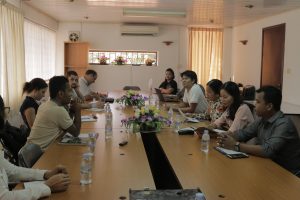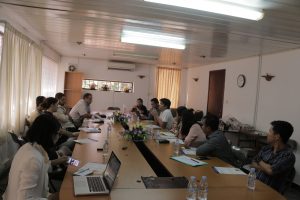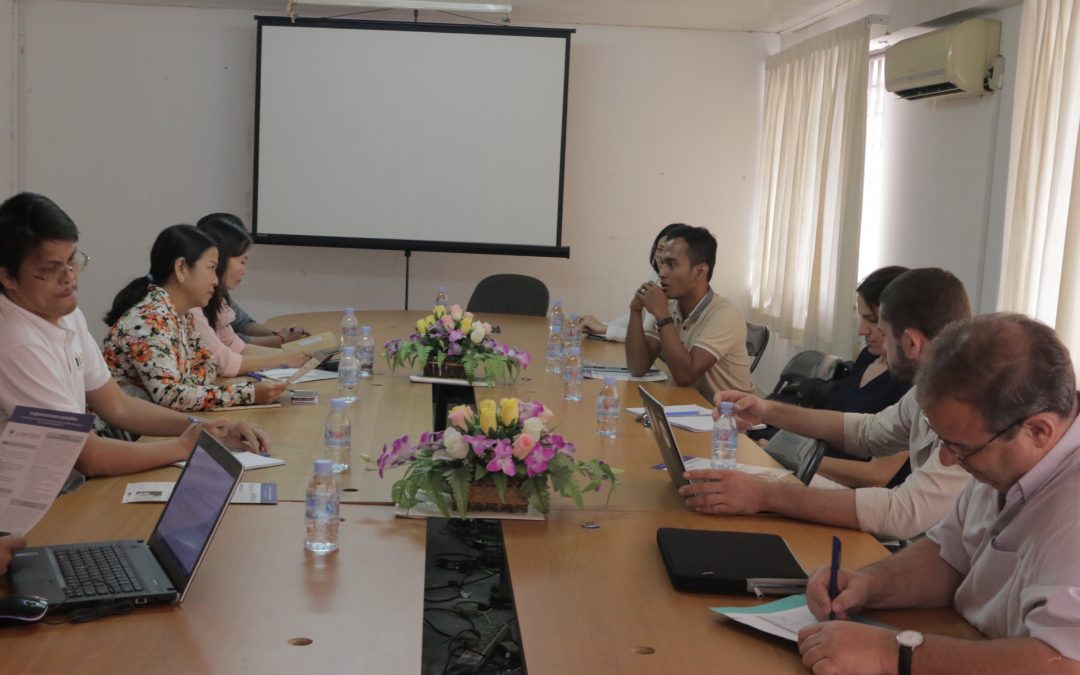It was meeting quite sometimes for people working on the health in Cambodia in which facilitated by Partnering to Save Lives previously and currently Open Institute thought that it is quite useful for us to come together and share what we were doing and people who interested in using technology for their health projects. The goal of the meeting is to know and share as much as possible on what we are doing and what we have done on health projects in Cambodia. It plans to be in every 3 months to catch up for everybody who are doing on health in Cambodia. ICT4D Cambodia Network project implemented by Open Institute received a grant from SPIDER to try to bring the learning of ICT4D projects in Cambodia together into reports that will be issued every year on mhealth/health issue.
Participants: Open Institute, People In Need, CARE, InSTEDD, Maries Stopes International, Mith Samlanh, FHI, Population Services Khmer, BBC Media Action, Cambodia National Malaria Center
Result of the discussion;
People In Need: Health program has been started since 2013 that used mobile phone technology IVR system to deliver health messages regarding maternal and child health to mothers and pregnant women who have registered receive automatic prerecorded voice messages to their phone which are designed to improve health behaviors and increase health service demand. These messages are variety of topics and targeted for specific ages of mother, pregnant women and children in community in providing information and advice in improving nutrition, avoiding of harmful traditional health practices (WASH), women pregnancy. It has been implementing in Kampong Chhnang, Kratie and Koh Kong province.
- What we have done is working with multiple partners, especially through establishing relationship with Health department of the 3 provinces mentioned above, we have worked at the health center level with midwife to allow mothers and pregnant women to register in receiving our voice messages on maternal health prevention and child health.
Question: How PIN work on the system? Is the system working very well? How does midwife play to mother on phone system?
Answer: It’s quite reflected our initial plan we have determined that it is required a few trainings “ hand-off approach” on registration of the actual program through IVR system to midwife the health center level through PHD. Then it allow PIN to monitor system at provincial level.
Care: She is here on behalf of Care and as well as Partners for Saving Life (Care, Maries Stope, and Save the Children). Care and partners developed an innovative project called “Chat! Contraception”, which is a set of tools consisting of interactive sessions, video drama, and a mobile quiz app aim to help female garment workers to learn about their contraceptive options so they can make informed decision and prevent unwanted pregnancies. It covers reproductive health including contraception and abortions with working about 16 factories in Phnom Penh and Kandal.
- Another project has just been started to develop an informed decision supported app again for factories workers for maternal and newborn health. The idea is once the pregnant women get to go to the infirmary and get extra counselling and for some they do not encouraged them to come again or they will be given extra time for visiting health center. This app will be decision support in a sense that messagers will be tailored to the condition of the mothers as well as effected date of delivery ect…
- Some a little bit similar to PIN that work supporting maternal and new born health for pregnant women.
InSTEDD: InSTEDD is a tech team. Relating to health, has been working with CDC on 115 project and currently, we have expanded for 25 provinces.
- 115 project is mostly supported health center/PHD to report outbreak once they have some case of outbreak happened at the ground and then they can report directly to nationally.
- InSTEDD has been trained them every month on reporting
- Another project we also have been working with NCHAD to strengthen the system.
- One outbreak recently that InSTEDD received from the hotline 115 about the breathe. The hotline is (Not SMS) also responded to answer on the question they asked.
Maries Stope International: MSI works on Worker health project with 30 factories and 16 private providers as such as referral hospitals and health centre, private clinics, pharmacies and factory’s infirmary to send/receive health information between the garment factory workers and our private health service providers through the mobile app.

- MSI provides tablet to the garment factory’s infirmaries to counsel to the workers.
- Once the workers need to deliver about contraceptives and reproductive health services, the referral system through factory’s infirmaries to those 16 private health service providers.
- It helps by sending the workers to their nearest private health service providers where they working at.
- Another mobile app is called “WorkerHealth Champion” or “Kamako Chhnoeum” in Khmer, which is set to allow also the garment workers to get answers to their questions by just making a call free of charge and following the IVR dialogue via their telephone keypad to participate in a quiz. It also allow the workers to learn from each other best practices.
- There also set up a call centre which is used as a central resource for health information and referrals provided and either call to follow up to workers.
- Facebook “WorkerHealth”
- Challeng: Sometime it complicated mobile send/receive information between referrals provided and factory’s infirmaries. Once the workers received message from their factory’s infirmaries, they have to pick their phone up to private health service providers.
Question: How it mobile app work?
Answer: It work both smartphone and dump phone.
Mith Samlanh: The Prevention Project works in 8 khan (districts) with 45 communities in Phnom Penh city. We have provided a range of services such as non-formal education, counselling, and life skill and as well as access to medical services (first aid).
- Mith Samlanh does not deploy any technology to use within the projects. But we have only hotline number.
- Pick them up to hospital if seriously wounded.
Question: Who is Mith Samlanh’s target beneficiary?
Answer: Street children and vulnerable community, especially most poor households.
Question: How Mith Samlanh work with them?
Answer: Establish peer-group to work with street children and in community, for example, peer-community, peer-street children. If there is any happened at the ground, peer will inform our staff or through hotline number. All report is involved paper work rather than specific technology and all report/data is compiled by staff at the head office in simple office files (M.Word, Excel)
FHI: The Cambodia HIV/AIDS Flagship project is a consortium of local and international nonprofit organizations, led by KHANA, with technical assistance from FHI 360 and Population Services International/Population Services Khmer (PSI/PSK). It is funded by USAID and will be end this year.
- FHI has been working with female entertainment workers, MSM (Men-Sex-Men), and transgender through providing them care and treatment.
- FHI’s technology, IVR system created by InSTEDD, Facebook page, website, and also use tablet to access their risk status through our developed question/answer tools whether high risk or at risk and refer them to make blood test.
- FHI has also adopted Grindr, a geosocial networking apps for special advocating for HIV especially MSM (gay). There are about 20,000 users in Cambodia.
- During its Grindr piloted period between October to December last year, we have reached individually around 500ps and finally resulted of blood test around 100ps HIV affected positively. Comparing with other tech tools, it was cheaper than and more effectively in term of grouping MSM and get to know each other profiles for MSM in Cambodia
- In technology, our challenges is that not so many of FHI’s target group have own smartphones, except MSM group more smartphone users.
- It’s hard to find available technology that suit transgender group in Cambodia, limited knowledge, and smartphone is not most popular tools at this group.
Question: How to reach them on Grindr?
Answer: Once they sign up, they register their phone number, One assigned coordinator will be sending SMS individually accordance with standard communication protocol required by USAID policy on positive prevention strategies to people living with HIV.
Question: Is it cost and what other requirement for using the Grindr?
Answer: It’s free of charge and need to sign up. User have to have a good knowledge in using technology and English is necessary on the apps.
PSK: 2 programmes, family planning and malaria programme
- For the family planning work through network providers such as Community Mobilizer and United Health Network, which is a group of local NGOs working on health; to support a family planning and reproductive health program through interpersonal communication with women reproductive age. To improve this service, we use internal system called “agent to health network”, a technology that have 4 modules, planning, assessment, feedbacks, and monitoring. We provide assistance/feedbacks to the network providers based on their performances that we have monitored at our center’s dashboard.
- For Malaria program, we also use a special app for malaria case surveillance app to improve data collection in PSK’s health network providers. So we train them before going in the field for data collection.
BBC Media Action: It’s a Multi media programme to produce TV episodes and drama for broadcasting on TV chanel and as well as radio live show that could reach out all youth across the country on issues of sexual and reproductive health.
- “Love9”, the first started project is best known by the people of BBC programme.
- The Love9 Facebook page has hit more than 1 million users in Cambodia.
- Although the project has now ended but the number of live of the Facebook still existing.
- Besides, BBC produced a toolkit and provided a skillful training for our partners who work on the area of health in Cambodia, where is some content of our produced Love9 TV and radio that might be helpful for sharing to their partners’ communities.
- Current project is called “Klahan9” or “Brave9” which is focused on employment and youth. It is currently looking for creating application that suit with above issues. So it’s good to be here to learn more from your success different apps projects that it would be useful for BBC to future integrated project.
Question: What is about on new project at BBC?
Answer: Currently it is in researching process on what kind of app (Trend) that most popular used by youth in Cambodia. Is it game apps? online web-based apps? or any other kind of app? Because that kind of help will be used by youth.
Cambodia National Malaria Center (CNM): Several systems has been deployed
- Currently we have 2 system been implemented in OD and health centre. 1st system called “Malaria Prevention System” is web-based to collect all malaria cases in Cambodia that detected by village malaria workers and health center staff. It also collected data on number of bed net.
- Another app called “Malaria Alert System” in cooperated with InSTEDD since 2011 that system is reported on malaria cases in Cambodia through SMS.
Question: is Malaria Alert System is still working? Nationally or what?
Answer: Yes, it is still working. It’s only piloted some area. For Malaria, prevention system is covered in 53 ODs in 21 provinces. The 2nd system has just modified to reporting by smartphone in Android version and been implemented in only Preah Vihear province funded by the ADB.
-Next year, it is going to support 800 tablets funded by the Global Fund to the health center in malaria targeted provinces allowing them to report in real-time on such above malaria cases and stock out management.
Question: How many total health center that NMC work with?
Answer: in total, it is 1300 health center in the whole country but we will only provide tablet to the malaria zone.
Question: Will you open to any other Health projects/Health NGOs use your tablets for data collection in another content within your health center coverage?
Answer: Talk to my management.
Question: How is the app work? is it required internet as Preah Vihear is quite far and very limited internet speed compared to Phnom Penh?
Answer: Yes, it’s not 100% fully access to internet but the apps is on and off-line.
Question: Is there any partners to develop its app?
Answer: No partners, it is developed by the National programme
Open Institute: In Health has its 2 main projects
- USAID Quality Health Services, Open Institute participation in this project, led by URC, involves making automatic phone calls to mothers of newborn children with pre-recorded messages that communicate important information for their health and the health of the baby. Data on mothers of newborn babies is produced by the work beign done in the Social Health Protection project.
- USAID Social Health Development, led also by URC, Open Institute involves developing the necessary tools for collecting data on patients in health centers called “Patient Management/Registration System (PMRS)” around the country, and uploading it to the national databases of the Ministry of Health. By getting of the data on the system, the system automatically generate into the report
- Open Institute uses of IVR technology in another project on employment services for low skill workers in Cambodia (Bongpheak project), which is not required internet and because most of them are not using smartphone. To do this we try to publish the job to the family members. So they can enter the phone to receive the announcement that we make a phone call to them directly and individually in voice. The platform is a small window to find job for poor and low skill worker in Cambodia.

